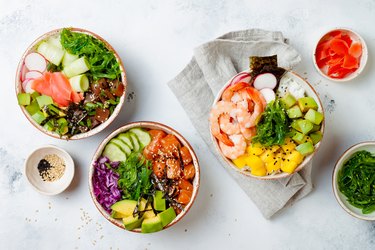
The average moderately active adult needs between 2,000 and 2,800 calories per day, according to the Dietary Guidelines for Americans. Even sedentary adults need at least 1,800 calories a day to maintain their weight. If you have some pounds to lose, lowering your intake to 1,500 calories per day can help you achieve your goal, and it's easy to track using a calorie calculator. To stay healthy during your weight loss journey, be sure to get enough carbohydrates and protein, which will maintain your energy level and help you preserve lean muscle mass.
Macros for 1,500-Calorie Diet
Video of the Day
Carbs, protein and fat are all necessary nutrients, even when you're dieting. Carbohydrates are your body's main source of energy. Proteins are also important for energy production, as well as for building and repairing tissue and for creating enzymes and hormones. When you reduce your calorie intake, it is especially important to maintain protein intake for satiety and so that you hold onto your lean muscle mass while burning fat.
Video of the Day
According to the National Academies, an adult's carbohydrate intake should comprise 45 to 65 percent of total calories. On a 1,500-calorie diet, this amounts to 675 to 975 calories from carbs. Protein should make up 10 to 35 percent of calories, or 150 to 525 calories.
This is a fairly wide range, and your specific needs always depend on your age, weight, activity level, gender and any health conditions you may have. For example, if, as part of your weight loss endeavor, you've increased your activity level, then you may need more carbs for energy and more protein to support muscle building and recovery. Your doctor or a nutritionist is the best person to help you figure out your exact needs.
Make Sure You're Getting Enough
Both protein and carbohydrates have 4 calories per gram. This is necessary knowledge when you're reading labels for the percent daily values for a 1,500-calorie diet. If you've determined you need 50 percent of your calories from carbs and 20 percent from protein, then you need to get around 188 grams of carbs and 75 grams of protein per day.
Packaged and prepared foods have nutrition facts labels to help you identify grams per serving. Whole foods typically don't come with nutrition labels, but you can use an online site like the USDA's Food Composition Database to learn information about a particular food.
Low-Carb, High Protein?
If you've explored weight loss diet options, you've probably seen a lot about eating low-carb or upping your protein intake significantly. However, according to the Diet Intervention Examining the Factors Interacting With Treatment Success (DIETFITS) study, results of which were published in the Journal of the American Medical Association in 2018, no one diet — low-carb, low-fat, high-fat or high protein — is superior to another for weight loss. What matters most is calorie intake and maintaining a calorie deficit so you are consistently burning more calories each day than you're consuming.
That said, protein and carbohydrate provide specific benefits when you're trying to lose weight. According to a 2015 review in Trends in Food Science & Technology, protein is the most satiating macronutrient, which means eating enough could help you feel fuller for longer while cutting calories. Complex carbohydrates from vegetables and whole grains contain dietary fiber — the part of plant foods the body doesn't digest. Fiber is also very satiating because it stays in your stomach longer than most foods, making you feel full.
This doesn't mean you have to eat more than the recommended intake for carbs and protein. It just means you should be sure to get enough of each — and enough of the right kinds of each.
Best Protein and Carbohydrate Foods for Weight Loss
Choosing your protein and carbohydrate sources is fairly easy. Stick to whole foods, and eschew packaged and processed foods as much as possible. Packaged foods, like many breads, chips and sweets, are often high in refined carbohydrates that have been stripped of fiber. These foods digest quickly and cause blood sugar to surge, which can lead to decreased energy and carbohydrate cravings. Instead, go for fresh vegetables and fruits, whole grains, and whole grain breads and pasta.
Similarly, many protein foods are high in fat — primarily saturated fat, which increases your risk of heart attack and stroke, according to the American Heart Association. Red meat, bacon and fried chicken are all sources of protein, but are also high in fat and calories. Lean beef, chicken, fish, eggs, tofu and beans are all quality sources of protein on a 1,500-calorie diet.
Read more: How Much Can You Lose on a 1,500-Calorie Diet?
- Trends in Food Science & Technology: Optimising foods for satiety
- MedlinePlus: Carbohydrates
- Dietary Guidelines 2015 - 2020: Appendix 2. Estimated Calorie Needs per Day, by Age, Sex, and Physical Activity Level
- National Academies: Dietary Reference Intakes: Macronutrients
- USDA: Food Composition Database
- Journal of the American Medical Association: Effect of Low-Fat vs Low-Carbohydrate Diet on 12-Month Weight Loss in Overweight Adults and the Association With Genotype Pattern or Insulin Secretion
- Harvard Medical School: Making one change — getting more fiber — can help with weight loss
- St. Joseph Health System: NOTHING FINE ABOUT REFINED CARBS
- American Heart Association: Saturated Fat